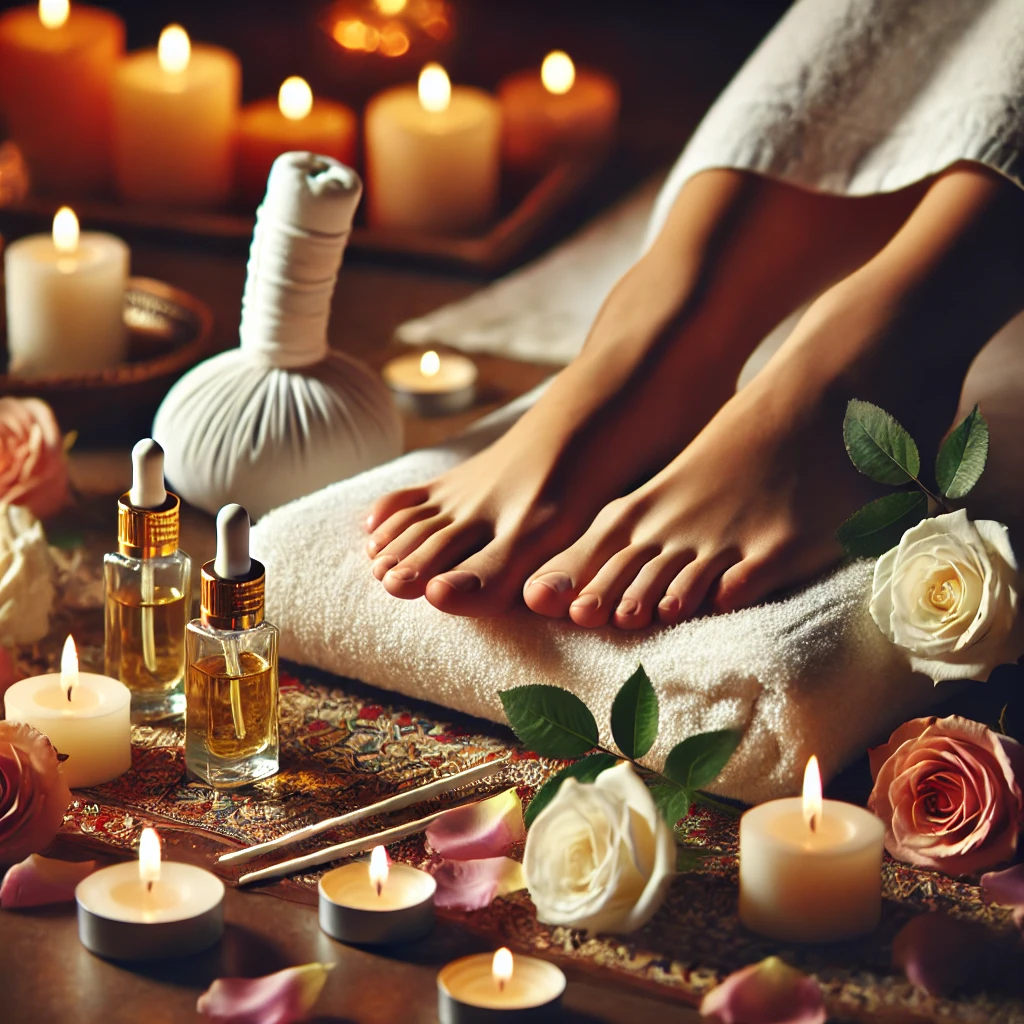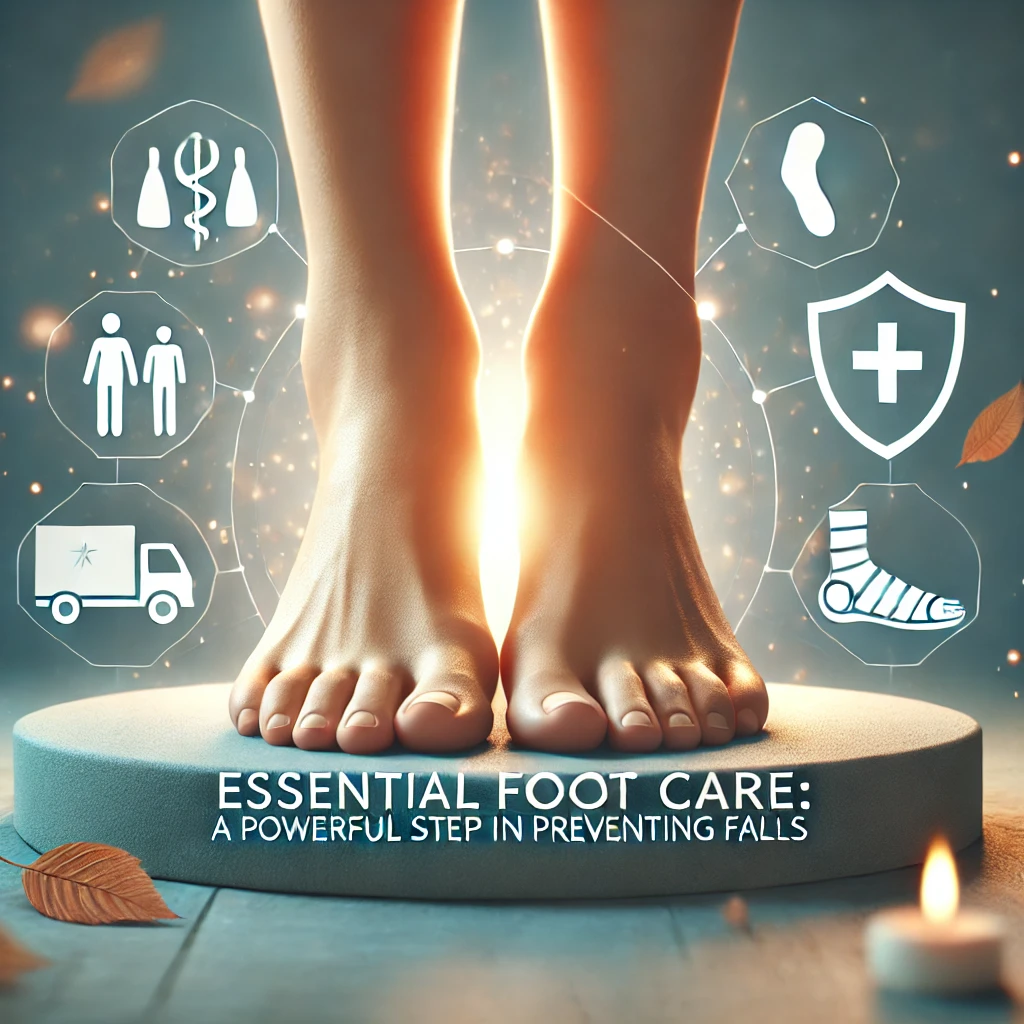Introduction
When you think about self-care, what comes to mind? Skincare, meditation, or maybe a relaxing bath? While these are all great, one essential part of self-care is often overlooked—foot health. Your feet work tirelessly every day, carrying your weight and allowing you to move freely, yet they rarely get the attention they deserve. Ignoring foot health can lead to pain, discomfort, and even serious medical issues over time.
Taking care of your feet isn’t just about aesthetics; it’s about maintaining overall health, mobility, and comfort. In this article, we’ll explore why foot health should be a vital part of your self-care routine and how you can incorporate simple yet effective habits to keep your feet in top shape.
The Importance of Foot Health

Your feet are the foundation of your body. They support your weight, help you move, and play a crucial role in your daily activities. Despite this, many people neglect their feet until they experience pain or problems.
Why Foot Health Matters
- Supports Daily Activities: Whether you’re walking, running, or standing, your feet are constantly at work.
- Affects Mobility: Foot pain can make even the simplest tasks, like grocery shopping or climbing stairs, a challenge.
- Connected to Overall Health: Foot issues can lead to back pain, poor posture, and even complications with chronic conditions like diabetes.
Ignoring your feet can result in discomfort and serious health concerns. Taking preventive measures can help you avoid long-term issues.
Common Foot Problems and Their Causes

Many people experience foot problems, often caused by neglect or poor habits. Some of the most common issues include:
Bunions, Corns, and Calluses
- Develop due to pressure and friction from ill-fitting shoes.
- Can cause pain and discomfort over time.
Fungal Infections and Athlete’s Foot
- Caused by moisture buildup and poor hygiene.
- Symptoms include itching, redness, and peeling skin.
Heel Pain and Plantar Fasciitis
- Results from excessive strain on the foot’s arch.
- Often caused by standing for long periods or wearing unsupportive shoes.
Other Causes
- Poor Footwear: Shoes that are too tight, lack arch support, or have high heels can lead to foot issues.
- Lack of Hygiene: Not cleaning and drying feet properly can lead to infections.
- Ignoring Pain: Small issues can turn into big problems if left untreated.
By understanding these common problems, you can take steps to prevent them and keep your feet in good condition.
How Poor Foot Health Affects the Rest of Your Body
Many people don’t realize that foot problems can impact other parts of the body. When your feet hurt, your posture, balance, and even mental well-being can suffer.
Effects on Posture and Back Pain
- Poor foot alignment can cause stress on your knees, hips, and lower back.
- Flat feet or high arches can lead to imbalances and discomfort.
Increased Risk of Falls and Injuries
- Foot pain can change the way you walk, increasing your risk of falling.
- Elderly individuals are especially at risk if they don’t maintain good foot health.
Connection to Diabetes and Circulatory Problems
- Diabetics must take extra care of their feet to prevent infections and complications.
- Poor circulation can lead to slow-healing wounds, which can become serious.
Taking care of your feet helps maintain balance, mobility, and overall well-being.
Benefits of Including Foot Care in Your Self-Care Routine

Making foot health a priority can bring many benefits, including:
- Improved Comfort and Mobility: Healthy feet make daily activities easier.
- Prevention of Pain and Infections: Simple habits can help avoid foot problems.
- Better Posture and Overall Health: Proper foot support reduces strain on your body.
Incorporating foot care into your routine can lead to long-term health benefits.
Daily Foot Care Tips for Healthy Feet
Taking care of your feet doesn’t require much effort, just a few simple steps:
- Wash and Dry Properly: Prevents infections and odor.
- Moisturize Daily: Keeps skin soft and prevents cracks.
- Trim Nails Correctly: Avoids ingrown toenails and infections.
- Wear Comfortable Shoes: Ensures proper support and reduces strain.
Adding these steps to your daily self-care routine can make a big difference in your foot health.
The Role of Proper Footwear in Foot Health
One of the biggest contributors to foot problems is wearing the wrong shoes. Many people prioritize fashion over function, which can lead to painful conditions over time.
Choosing the Right Shoes
When selecting footwear, consider the following factors:
- Size Matters: Shoes that are too tight or too loose can cause blisters, calluses, and bunions.
- Arch Support: Flat feet and high arches require proper support to prevent pain and strain.
- Breathability: Shoes made from breathable materials help prevent fungal infections.
When to Replace Old Shoes
Worn-out shoes lose their cushioning and support, leading to foot fatigue. Signs that it’s time to replace them include:
- Worn-out soles and uneven tread wear.
- Persistent foot pain or discomfort after wearing them.
- Visible creases or flattening of the shoe’s interior support.
Investing in quality shoes can prevent many common foot ailments and improve your overall foot health.
Foot Exercises and Stretches for Strength and Flexibility
Just like any other part of the body, feet need exercise to stay strong and flexible. Strengthening foot muscles can prevent pain and injuries.
Simple Exercises to Improve Foot Strength
- Toe Curls: Pick up small objects using your toes to strengthen foot muscles.
- Heel Raises: Stand on your toes and slowly lower your heels to improve balance and strength.
- Towel Scrunches: Place a towel on the floor and use your toes to scrunch it toward you.
Stretches to Relieve Tension and Pain
- Calf Stretch: Stand facing a wall, place one foot behind the other, and lean forward to stretch the back of your leg.
- Plantar Fascia Stretch: Sit down, grab your toes, and gently pull them toward you.
- Ankle Rotations: Rotate your ankles in circular motions to improve flexibility.
Regular foot exercises help maintain mobility and prevent stiffness.
The Connection Between Foot Health and Mental Well-Being
Taking care of your feet isn’t just about physical health—it can also improve mental well-being. Foot care promotes relaxation, reduces stress, and enhances mindfulness.
Foot Massages for Relaxation
A foot massage can:
- Improve circulation.
- Reduce stress and anxiety.
- Relieve foot pain and tension.
Reflexology and Its Benefits
Reflexology is a form of therapy that applies pressure to specific points on the feet. It is believed to:
- Promote relaxation.
- Improve energy flow in the body.
- Reduce symptoms of anxiety and depression.
A simple 5-minute foot massage at the end of the day can do wonders for both your body and mind.
Professional Foot Care: When to See a Podiatrist
While daily foot care is important, some conditions require professional attention.
Signs You Should See a Podiatrist
- Persistent pain in the heels, arches, or toes.
- Swelling, redness, or infections that don’t heal.
- Difficulty walking due to foot discomfort.
Why Regular Checkups Matter for Diabetics
Diabetes can lead to serious foot complications, including infections and ulcers. Regular visits to a podiatrist can help prevent these issues and ensure proper care.
Ignoring foot problems can lead to long-term complications, so it’s essential to seek medical help when needed.
DIY Home Remedies for Common Foot Issues
If you experience minor foot problems, natural remedies can provide relief.
Epsom Salt Soaks for Relaxation
- Helps relieve sore muscles.
- Reduces inflammation and swelling.
- Softens calluses and dry skin.
Natural Moisturizers for Dry Feet
- Coconut Oil: Hydrates and prevents cracks.
- Shea Butter: Deeply moisturizes and softens skin.
- Aloe Vera: Soothes irritation and promotes healing.
Remedies for Foot Odor and Fungal Infections
- Apple Cider Vinegar Soak: Helps eliminate bacteria and odors.
- Tea Tree Oil: Has antifungal properties to combat infections.
- Baking Soda: Absorbs excess moisture and neutralizes odor.
Using simple, natural remedies can help maintain healthy and happy feet.
How Weather Affects Foot Health
Your feet go through different challenges in different seasons. Adapting your foot care routine based on the weather is essential.
Winter: Dryness and Cracked Heels
- Cold air can cause dry, flaky skin.
- Moisturizing daily prevents cracks and discomfort.
- Wearing warm socks helps maintain circulation.
Summer: Sweating and Infections
- Open footwear increases the risk of fungal infections.
- Feet sweat more, leading to odor and irritation.
- Keeping feet clean and dry prevents problems.
Adapting to seasonal changes ensures your feet stay comfortable all year round.
Foot Care for Different Age Groups
Each stage of life requires different foot care needs.
Children’s Foot Health
- Ensure they wear properly fitted shoes for healthy development.
- Check for any signs of flat feet or walking difficulties.
Foot Care for Adults
- Maintain daily hygiene and moisturization.
- Choose comfortable shoes to prevent foot strain.
Elderly Foot Care
- Regularly check for cuts, swelling, or infections.
- Wear supportive footwear to prevent falls.
Caring for feet at every age ensures lifelong mobility and comfort.
Foot Health and Sports: Tips for Athletes
Athletes put extra pressure on their feet, making foot care essential for performance and injury prevention.
Pre-Exercise Foot Care
- Always warm up before workouts.
- Wear well-fitted sports shoes for support.
Post-Exercise Foot Recovery
- Soak feet in warm water to relax muscles.
- Stretch feet and ankles to prevent stiffness.
By taking care of their feet, athletes can prevent injuries and enhance performance.
Myths and Misconceptions About Foot Care
There are many myths about foot health that can lead to poor habits.
Common Myths Debunked
- “Walking Barefoot is Always Good”: While it can strengthen feet, walking barefoot on hard surfaces can cause strain.
- “Only Elderly People Have Foot Problems”: Foot issues can affect people of all ages.
- “Pain is Normal”: Foot pain is not normal and should not be ignored.
Knowing the facts about foot care can help you make better choices.
Final Thoughts: Making Foot Health a Priority
Your feet do so much for you—why not take care of them in return? Incorporating foot care into your self-care routine can improve your comfort, mobility, and overall health.
How to Get Started
- Add foot care to your daily routine.
- Wear proper footwear for support.
- Exercise and stretch your feet regularly.
Making small changes today can prevent major problems in the future. Prioritize your foot health and enjoy pain-free movement for years to come!
Frequently Asked Questions (FAQs)
1. How often should I moisturize my feet?
Daily moisturization is recommended, especially if you have dry or cracked skin.
2. Are high heels bad for my feet?
Wearing high heels frequently can cause foot pain, bunions, and posture problems. It’s best to limit their use.
3. How can I prevent athlete’s foot?
Keep feet dry, wear breathable shoes, and avoid sharing footwear with others.
4. Why do my feet hurt after a long day?
Foot pain can be caused by standing for long hours, poor footwear, or lack of support. Stretching and wearing supportive shoes can help.
5. When should I see a doctor for foot pain?
If pain persists for more than a few days, worsens over time, or affects your mobility, consult a podiatrist.









